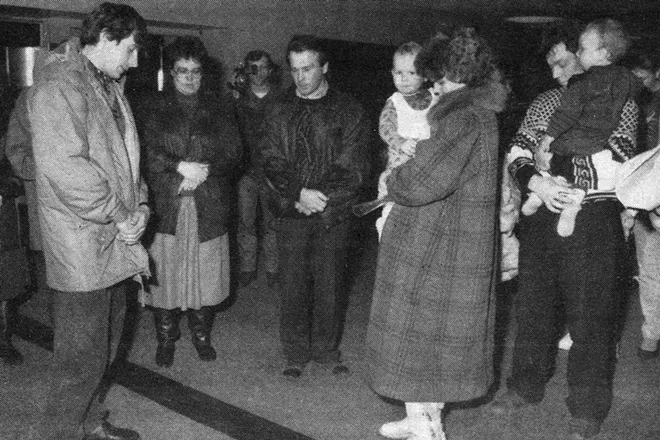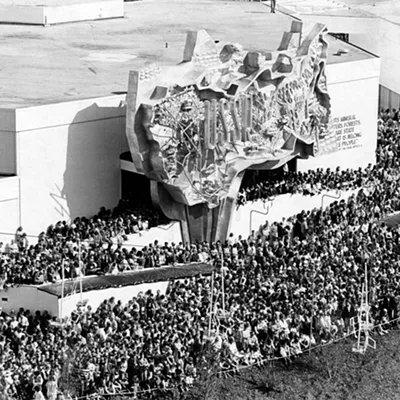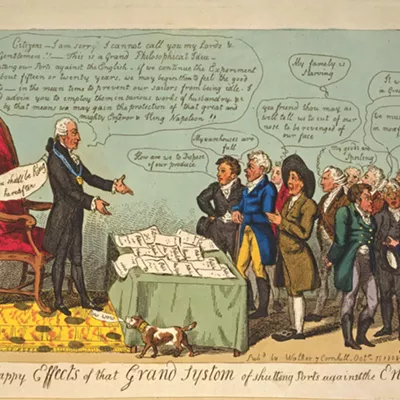
EDITOR'S NOTE: This story was first published on December 8, 1993.
Soft-spoken and gentle-eyed, almost plaintively accommodating, Spokane residents Yelena and Alexander Solodyankin are rewarded for being the first members of the greeting party to arrive at Spokane International Airport by being subjected to a reporter's interview. Yelena holds two long-stemmed roses for her arriving countrymen.
In a few minutes the United Airlines jet will roll up to the end of the passenger chute, the door of gate B3 will open and two young Russian families will be enclosed in clasping embraces, receive resounding smacks on the cheek and be studied with restrained tearfulness by relatives who preceded them to the United States. When the clasping and smacking are done they will shake hands with new American friends, claim their baggage and begin the long process of adjustment to a new land.
Two years ago the Solodyankins were the ones deplaning. They came to Spokane from Kyrgyzstan, an arid, mountainous, mineral-rich republic of the old Soviet Union, much closer to the Chinese province of Sinkiang and Afghanistan than to Moscow or St. Petersburg. As Russian Christian teachers living among Muslims and Sufis, a combination of pressures forced them to emigrate.
After Mikhail Gorbachev's rise to power in 1984 and the dismantling of Soviet domination that followed, religious politics filled the vacuum left behind. Kyrgyzstan fell under the domination of the Muslim majority. As a result, Christians who do not convert often have trouble sending their children to schools, finding employment and retaining other rights.
Fortunately for the Solodyankins, the U.S. State Department gives preference for emigration to citizens of the disbanded Soviet Union who can prove that they suffered religious persecution. The Solodyankins fell into that category. After two years of lobbying the U.S. Consulate there, they and their three sons were allowed to follow others like them to Spokane.
Now the Solodyankins are among the thousands — official estimates vary between 3,000 and 5,000 — of citizens of the former Soviet states who have arrived in Spokane since the fall of Communism.
On this Thursday evening, three more Russian families with relatives already here are scheduled to arrive. There to greet them are a group of neatly dressed young immigrants in their 30s and a delegation from Mountain View Church of the Nazarene — one of five churches in metropolitan Spokane with a large number of former Soviet citizens in its pews.
By the time the flight arrives, about 30 greeters have formed a quietly expectant semicircle around the gate. The first Russians off the plane are Nikolai and Natasha Laptev, Nikolai carrying the couple's tired-looking baby. Then come Nikolai and Luba Gurdumov, another young couple with a chubby infant beaming toothlessly at the welcomers.
Within a few minutes they are on their way to claim their baggage. Before them, English lessons, new households, schooling, homesickness, and work they have not been prepared to do. But first the semicircle closes and Alexander Solodyankin says a prayer in Russian, offering thanks for the safe arrival of the Gurdumovs and the Laptevs. As welcomers and newcomers move to the baggage carousels, Lee Branum, an American member of the Mountain View Nazarene greeting party, follows along and discusses the difficult transition all Russian immigrants face.
Many of the Christians who come as immigrants to Spokane receive resettlement help from World Relief, a national organization sponsored here by the Greater Spokane Association of Evangelicals, which includes 90 churches. World Relief social workers Heather Grannis and John Tusant share a small upstairs office at the Fourth Memorial Church.
Nobody would ever suggest that emigration is simple. Former Soviet citizens arriving in the United States are expected in a few months or a year to perform in their own lives the transformation that, given the most favorable circumstances, Gorbachev, Boris Yeltsin and their successors might accomplish in 20 years: Change from the powerful routines of state socialism to the challenges of living and working in a free society.
As newcomers to Spokane from nine former Soviet republics learn English, get their children into school, find housing and work, and get the health and dental care that the older immigrants often need, Grannis and Tusant see the adjustment firsthand and appreciate how frustrating it can be.
"'They come from a dark environment where the curtains have been pulled," Tusant says. "They are accustomed to a socialist system. I try to help them understand the work ethic and meet the responsibility they accepted to the American government to becoming economically self-sufficient and productive citizens."'
Admirable goals, but not easily attainable for newcomers from nations where grass is cut (very efficiently, actually) with scythes, where streets are still repaired with picks and shovels, where technology of all kinds is a generation or two behind that employed in the United States, with no current hope of ever catching up.
Tusant also notices a less tangible challenge. Soviet tyranny offered security to the obedient, rewarded loyalty and the approved kinds of diligence, but it was the kind of security that stifled the imagination.
"When they arrive and I ask them what they want to do, they say, 'learn English,'" Tusant says. "Beyond that they have no idea. The system they have lived under seems to have squelched their ability to dream about what they might do. We try to help them think about possibilities."
Tatyana Bogomazova has a toothache. She spent a long session yesterday with the dentist, and it left one side of her face feeling swollen and heavy. She doesn't feel well, and she has just finished a long session of the series of English classes she attends every day at Gonzaga University. But she has time to talk, albeit in her own developing style of English.
She came to the United States earlier this year as a visitor, not an immigrant or a refugee. Her home is the busy industrial metropolis of Kharkov, about halfway between Moscow and the Black Sea port of Yalta.
Her parents, both engineers, were good friends of the Kharkov Symphony's director, Vakhtang Jordania, who left the Ukraine to become music director of the Spokane Symphony. On a visit back to Kharkov, where he renewed his acquaintance with the Bogomazova family, he asked Tatyana, "Do you want to go to America?"
Of course she did. "I am not married," she says. "I'm young. I don't have my own family. Some people thought I won't go back to Russia."
Jordania has moved on, but Tatyana is living with a family on the South Hill, and while she remains undecided about her direction (she is only 21), she thinks she may want to stay in the United States and get a green card, which will allow her to resume her profession. In Kharkov she was a trained physician's assistant. She's thinking about becoming certified as a nurse.
In a good-natured way, Tatyana finds some characteristics of American life confusing. Poor as they might be these days, Russians and Ukrainians dress neatly when they go out. Tatyana dresses well, at times elegantly. Deliberately torn jeans, the eccentricities of young men who wear plaid shirts tied around their waists, the cultivated messiness and outlandish costumes found on any American street, to say nothing of the downtown punks with their year-round Halloween makeup and spiked green hair — why, Tatyana asks with an eloquent shrug, why?
But she's optimistic. "Here it opens for me a different life. It's absolutely different. It's fun to try to live in a different way." ♦
Michael J. Kirkhorn was the beloved director of the journalism school at Gonzaga University when he wrote this story for the eighth edition of the Inlander. Prior to that, he worked in many daily newsrooms, including in Chicago and Milwaukee; he was a Harvard Niemen Fellow in 1970. The summer before he wrote this story, he had spent three weeks in Russia through a grant from the Freedom Foundation. Kirkhorn died in 2001 of leukemia at the age of 64.




















